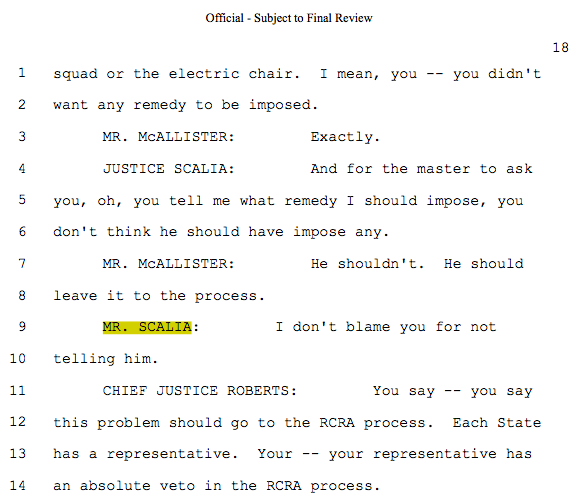President Obama reveals to Jeff Toobin that the best decision of the Supreme Court was to deny certiorari in the same-sex marriage cases.
I asked him to name the best Supreme Court decision of his tenure. When the Court upheld the constitutionality of the Affordable Care Act, in 2012? When it struck down the Defense of Marriage Act, a year later? Neither, it turned out.
“In some ways, the decision that was just handed down to not do anything about what states are doing on same-sex marriage may end up being as consequential—from my perspective, a positive sense—as anything that’s been done,” the President said. “Because I think it really signals that although the Court was not quite ready—it didn’t have sufficient votes to follow Loving v. Virginia and go ahead and indicate an equal-protection right across the board—it was a consequential and powerful signal of the changes that have taken place in society and that the law is having to catch up.” In the Loving decision, from 1967, the Court held that states could no longer ban racial intermarriage.
In other words, Obama’s favorite decision was one in which the Court allowed the political process to go forward, one state at a time. Not long ago, the President described his foreign-policy doctrine as one that “avoids errors. You hit singles, you hit doubles.” On same-sex marriage, the Supreme Court had hit a single, or maybe a double, and that was fine with him.
Obama opposed marriage equality until May of 2012. He told me that he now believes the Constitution requires all states to allow same-sex marriage, an argument that his Administration has not yet made before the Supreme Court. “Ultimately, I think the Equal Protection Clause does guarantee same-sex marriage in all fifty states,” he said. “But, as you know, courts have always been strategic. There have been times where the stars were aligned and the Court, like a thunderbolt, issues a ruling like Brown v. Board of Education, but that’s pretty rare. And, given the direction of society, for the Court to have allowed the process to play out the way it has may make the shift less controversial and more lasting.
This is a remarkable answer. When he says “strategic,” he means “political,” in the sense of the Warren Court making calculated decisions of how best to advance policy. By the way, I’m not sure that anyone actually believes he had this constitutional epiphany in May of 2012. Rather–as I wrote at the time–Vice President Biden forced his hand.
Update: A colleague on Facebook made an important point. It is simply not true that the “Court allowed the political process to go forward, one state at a time.” This is an instance where the judicial process went forward, one court at a time. All of the states that eliminated their bans on same-sex marriage by legislative process did not need to rely on the judicial process. Here, it is the courts that started the process, but the Court did not complete it. Obama’s explanation betrays a startling lack of concern for the difference between the political and judicial process–this is very much in keeping with his critical view of the law.
